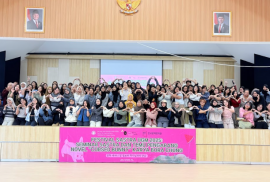Yogyakarta, 17/9/2025 – The Master’s Program in Literature, Faculty of Cultural Sciences, Universitas Gadjah Mada, organized an academic workshop themed “Breaking Into Reputable Journals: Strategies for Writing and Publishing Academic Articles.” The event, held on Wednesday (17/9) at Auditorium C, Poerbatjaraka Building, featured two keynote speakers: Prof. Dr. Wening Udasmoro, S.S., M.Hum., DEA., professor at the Faculty of Cultural Sciences UGM, and Adwidya Susila Yoga, S.Pd., M.A., an academic as well as a practitioner in scientific publishing. The session was moderated by Nada Nadillah.
In her presentation, Prof. Dr. Wening Udasmoro emphasized that writing for reputable journals requires decisiveness in selecting the issue and accuracy in building methodological frameworks. “The first thing to pay attention to is the material or issue. A strong issue is one that is specific, contextual, and intellectually challenging. Do not fall into the trap of cliché topics,” she explained.
She gave examples of fresh entry points in literary research, such as LGBTQ+ issues in Muslim-majority countries, abortion debates in Muslim contexts, and the rebellion of Indonesian women writers against male-dominated literary traditions.
Prof. Wening also highlighted the importance of a novelty-based literature review. “The literature review is the foundation. It is from there that we can demonstrate our contribution to academic debates. If we only repeat previous studies, our work will not be considered competent,” she stressed.
The second session, delivered by Adwidya Susila Yoga, S.Pd., M.A., underlined the importance of accuracy in identifying target journals and the necessity of determining clear topics. “Writing an article cannot be separated from mapping the topic and having a clear storyline. After that, we need to do optimal sourcing—do not let references pile up only in the introduction while being scarce in the discussion. The next step is the ‘journal hunt,’ which means finding journals that match the topic, are consistent, and have a good reputation,” he explained.
He also warned participants about the dangers of predatory journals. “If a journal has an excessively high publication frequency, an unusually fast review process, an invalid E-ISSN, or ambiguous publication fees, we need to be cautious. Those are usually signs of a predatory journal,” he cautioned.
Furthermore, Adwidya encouraged students to utilize digital tools. “Use digital platforms such as Grammarly, DeepL, Vosviewer, and even AI—but their use must be academically accountable. Do not just use them recklessly,” he noted.
The workshop continued dynamically with a Q&A session between participants and speakers. Naria (Master’s in Literature) raised a question regarding the selection of research material: “Should research objects be literary works that have already received awards? And should research questions always be derived from theory?” she asked.
Responding to this, Prof. Wening stated, “Research objects do not have to be award-winning works. What matters most is the issue we want to bring forward. Focus on novelty and the perspective we present, not the credibility of the text itself. As for research questions, they can arise from the problems we want to examine, not necessarily from theory alone.”
Meanwhile, Andi (Master’s in Public Administration) asked about balancing local research with global issues. “Indonesia’s research strength lies in its rich empirical evidence. How can we balance this with global issues to ensure relevance?” he inquired.
Prof. Wening emphasized, “The key is to focus on contextual issues while still opening up to global debates. Take issues that others may not be familiar with, then connect them to wider discourses. That way, our research will gain international appeal.”
This workshop successfully provided in-depth insights into strategies for writing academic articles and breaking into reputable journals. Participants not only gained theoretical knowledge but also practical guidance from the speakers. With this momentum, the Master’s Program in Literature at FIB UGM hopes its students can produce high-quality, contributive scholarly works capable of competing at both national and international levels.
Author: Marsya Kamila / Public Relations, Master’s Program in Literature







